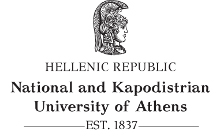DIPLOMA THESIS
4th semester
Learning objectives
The Diploma Thesis constitutes an independent scientific and systematic approach to the analysis of a topic and the synthesis of proposed solutions, combined with the information available in the existing literature and/or research.
The subject of the thesis is based on an original idea and can have a research paper or systematic review structure.
The Diploma Thesis has a research, study, development or applied research character and is prepared by each student preferably individually, or exceptionally in collaboration with another student provided that the approach to the subject is broad and is facilitated in its management by the collaboration two researchers.
The Coordinating Committee, following a request from the candidate, which states the proposed title of the thesis, the proposed supervisor (if no supervisor has been appointed for the postgraduate student since the start of his/her postgraduate studies) and his/her attached summary of the thesis proposal, designates its supervisor and sets up the three-member examination committee (T.E.E.) for the approval of the work, one of whom is the supervisor.
Members or supervisors of the three-member examination committee for the preparation of the diploma thesis are appointed from all categories of the postgraduate study program’s teaching staff.
With the guidance of the supervisor, students are given the opportunity to gain significant experiences from the comprehensive study and in-depth investigation of a distinct specialization topic. During the preparation of the diploma thesis, students are asked to develop critical and combinatory thinking, organization and analysis skills, applying the rigorous, systematic and scientific approach.
The purpose of the diploma thesis project is to complete the students' knowledge and develop their skills in the processing of independent topics in the fields of risk assessment and management, health and safety at a professional, environmental and pharmaceutical level.
It is the culmination of the overall effort of each postgraduate student and the final stage of the postgraduate study process.
After the successful completion of the Diploma Thesis, the student will be able to:
- To clearly recognize the limits of a problem to be solved and to fully recognize its main and secondary aspects, focusing on the most essential points for its solution.
- To describe and document the basic knowledge related to the topic of the research being prepared
- To summarize the existing scientific knowledge and expertise on the subject
- To use in a critical and synthetic spirit the available bibliography for a specific thematic area.
- Formulate a clear research question, design a research plan and develop an appropriate methodology for approaching and investigating a topic under study and organize a plan for its implementation
- To write a complete scientific/research essay
- Communicate clearly and effectively his/her conclusions, as well as the knowledge and reasoning on which they are based, by successfully making a comprehensive presentation before the three-member examining committee
- To combine knowledge and use expertise to solve complex problems in new problems of a broader or interdisciplinary context related to the subject of study
- To select appropriate technical and methodological approaches and adapt them to the problem to be solved using original thinking
- To evaluate the proposed approach/solution, placing it in a context of comparison with equivalents in the Greek and international literature and to comment on its relative advantages and disadvantages, documenting his/her opinions and choices
- To analyze results and draw conclusions
Course content
The preparation of the Diploma Thesis covers the entire 4th semester of the Master's Program.
The aim of preparing a diploma thesis is to deal with issues in order to solve, at a theoretical and applied (implementation) level, one or more problems that are included in the subject matter of the Master's Program and to implement a research question.
In this way, the student is provided with the opportunity to synthesize and utilize the knowledge acquired during his studies.
Diplomatic works can be:
- Research/Theoretical: structured and systematic assessment of the existing research literature on a particular subject area and aims to provide an overall overview, synthesis and critical assessment of the current state of research in a particular subject area.
- Research/Developmental: focus on the development of a research question, based on existing literature and usually the main part of the paper, so as to demonstrate its application.
The results of the preparation of the diploma thesis are summarized in the text of the thesis which may include:
- Description and analysis of the topic of the thesis, in such a way that the subject of the thesis, the work hypotheses and the dimensions of the proposal space are understandable by the reader.
- Analysis of the current situation in the related scientific subjects, presenting the basic concepts and requirements of the problem, the research or other results on which the work is based, and the objectives of the thesis.
- Description of the assumptions for conducting the research and the methodology for implementing the work.
- Description of conclusions and recommendations. This description may include theoretical proposals (further research and enrichment of the available literature) and/or implementation of practical applications and solutions.
- Final conclusions of the thesis that will concisely and categorically include the main findings and results of the research, weighted for their understanding by the reader and the performance of the contribution of postgraduate student’s work to the research field on the chosen research question/hypothesis.
- Analysis of the bibliography where all the books or articles used in the text or in the footnotes or other supplementary bibliography, sources, etc. will be recorded.
- Appendices containing all instruments (e.g. questionnaire) used, interview transcripts, tables, charts, images, etc.
